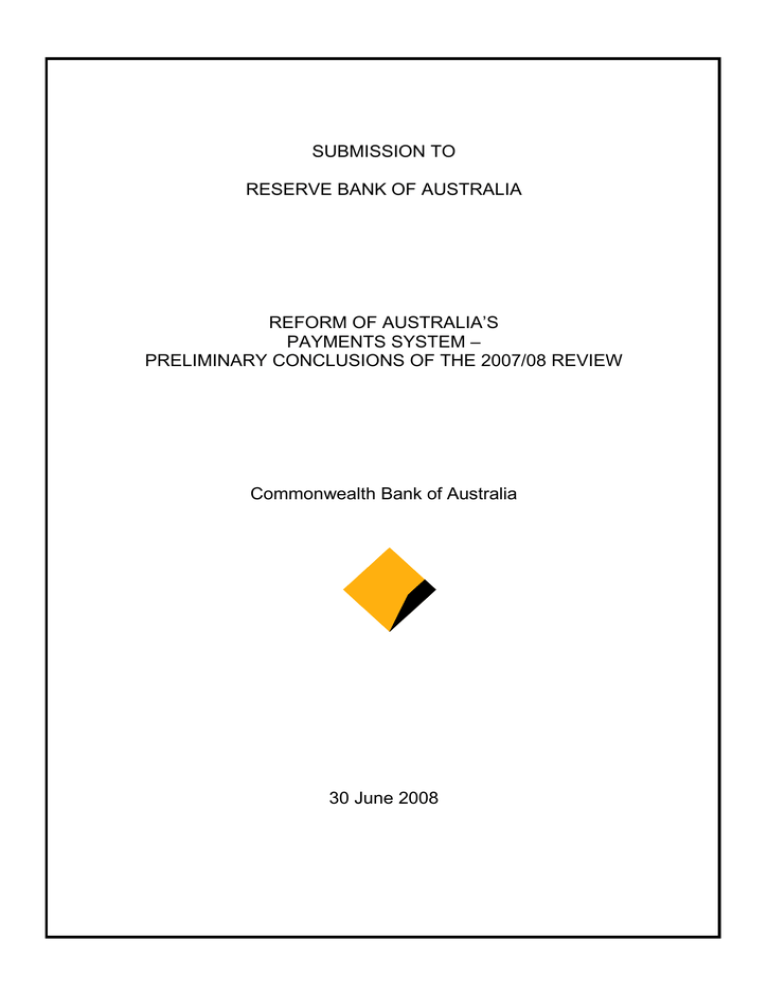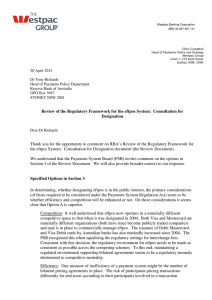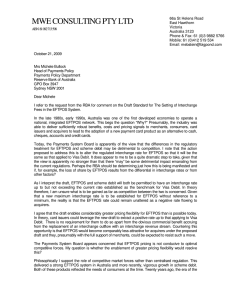SUBMISSION TO RESERVE BANK OF AUSTRALIA REFORM OF AUSTRALIA’S
advertisement

SUBMISSION TO RESERVE BANK OF AUSTRALIA REFORM OF AUSTRALIA’S PAYMENTS SYSTEM – PRELIMINARY CONCLUSIONS OF THE 2007/08 REVIEW Commonwealth Bank of Australia 30 June 2008 1. INTRODUCTION The Commonwealth Bank of Australia (the Bank) welcomes the opportunity to comment on the Reserve Bank of Australia’s (RBA’s) Preliminary Conclusions for the 2007/08 Review. We have had a long-standing interest in the RBA’s Payment System Reforms and the current Review. As a major participant in Australia’s payment systems we are keen to ensure that those systems continue to deliver value to our customers. st The RBA’s Preliminary Conclusions document issued on 21 April 2008 sets out three draft options for consideration, which we address in this submission: Option 1: Status quo, retention of the existing standards but with minor amendments such as alignment of the interchange fees for EFTPOS purchase and cash-out transactions; Option 2: Revised standards with reduced Credit Card interchange at 0.30% average, and alignment of EFTPOS and Scheme Debit interchange at $0.05 paid to the issuer; and Option 3: Deregulation of interchange fees, subject to a number of conditions being met. Option 3 is identified as the RBA’s preferred option, with Option 2 to be implemented if the conditions for Option 3 have not been adequately met by the industry. 2. PRINCIPLES FOR PAYMENT SYSTEM REGULATION The Bank’s previous submission to the 2007-08 Review outlined a number of key principles, including the following: Interchange Fees should be transparent, simple and relatively stable; Participants on both sides of a two-sided market need to be able to maximise the network benefits by directly pricing to their customers in a way that is transparent and sensible from the perspective of each customer group; Payments System Integrity and Customer Utility must be maintained; Network owners/participants should be able to self-manage, with transparency in approach and review; and Regulatory Intervention must only occur where there is a demonstrated market failure, and regulatory intervention should be transparent, competitively neutral, and provide a degree of certainty to facilitate ongoing investment in maintenance and innovation. Our response to the preliminary conclusions and draft options is based on these principles. In line with these principles, we welcome the opportunity for deregulation under Option 3, and restate our objection to ongoing regulation under Option 2. 3. COMMENTS REGARDING PRELIMINARY CONCLUSIONS Deregulation of Interchange Fees – “Option 3” Of principal importance to the future of the industry is the statement that the Board “is prepared to step back from the regulation of [interchange] fees on the condition that industry takes further steps to 1 improve the competitive environment.” We enthusiastically welcome this direction, which marks a significant evolution in the Reserve Bank’s approach to regulation. The Bank will continue to work with the RBA, with other financial institutions and payment schemes, and with industry organisations of which we are a member, to ensure that the opportunity to achieve deregulation of interchange fees (Option 3) is not lost. The Payments System Board acknowledges that the reforms have led to a “more soundly based 2 competitive environment” , and “The specifics of developments over the next year will be crucial in convincing the Board that its concerns about efficiency and competition would continue to be addressed if it removed interchange regulation. The Board has identified changes in three areas that would, in its opinion, further strengthen the competitive environment. These include: changes to the 1 “Reform of Australia’s Payments System - Preliminary Conclusions of the 2007/08 Review”, Reserve Bank of Australia, Sydney, 2008, page 39. 2 Ibid, page 38. Commonwealth Bank of Australia – Submission to the 2007-08 Review of Payments System Reforms Page 2 of 6 EFTPOS system that would enhance competition; modifications to the honour-all-cards rule in addition to those discussed in point 5; and greater transparency around scheme fees and average 3 interchange fees.” We believe a number of initiatives already under way, or planned, will achieve the Board’s desired outcome of increased competition, and permit deregulation to proceed as proposed. Each of the Board’s proposed changes is addressed in turn. Changes to the EFTPOS System “…the Board has identified a number of changes to the EFTPOS system that would be expected to improve the competitive environment. These include: (i) the introduction of a scheme to replace the existing bilateral contracts, with the scheme able to make decisions about multilateral interchange fees; (ii) the creation of effective arrangements to promote the development of the system; (iii) reform of current access arrangements; and (iv) the development of alternative payment instruments for use in on-line payments (either by the 4 EFTPOS scheme or through another channel).” We make the following comments regarding EFTPOS: (i) The industry proposal to establish an EFTPOS scheme, including multilateral setting of interchange fees, was outlined in our earlier submission to the 2007-08 Review. We continue to actively support that work. Negotiations regarding details of the scheme are well under way, and we expect that invitations to join the proposed scheme will be issued to prospective members in the second half of 2008. Noting the history of EFTPOS interchange negotiations, achieving legally enforceable multilateral interchange arrangements for the proposed scheme will not be without challenges, and we ask the RBA to support the proposed scheme’s efforts to do so. (ii) “Effective arrangements to promote the development of the system” may take many forms. EFTPOS currently suffers from significantly poorer functionality than competing Scheme Debit products, especially: lack of online payments functionality for Australian merchants, lack of online payments functionality for foreign merchants, and lack of card-present acceptance by foreign merchants. Developing detailed proposals for new EFTPOS functionality to address those shortcomings would require investment of substantial time and money by the scheme and its members, and new EFTPOS functionality is unlikely to be implemented by August 2009. In order for EFTPOS to survive and prosper, it is necessary that decisions to invest in new payments functionality are based on sound business cases rather than just regulatory decree. Once the EFTPOS scheme has been established, it should investigate the business case for functional enhancements to EFTPOS, and subject to this being demonstrated, scheme funding arrangements to develop the system. We will actively support the development of the business case. (iii) Work under way by the industry to develop an EFTPOS Scheme will remove the need for new members of the prospective scheme to negotiate commercial arrangements with each other member of the EFTPOS system. The current EFTPOS access regime provides for new members to join for a fee which is substantially less than the cost of providing that access. Access regimes should allow for the cost of a new entrant to access existing infrastructure to be fully recovered from the new entrants. Where a new entrant’s membership of payment systems is effectively subsidised by existing members, there is a danger of uncommercial new participants whose membership is not warranted by the ability of the prospective member to bring meaningful business to the system. Since the adoption of the EFTPOS Access Regime, there has been only one new acquirer join the card payment systems, and limited realignment of connection arrangements for issuers, but all of our new connections have been negotiated without reliance on the EFTPOS Access Regime. No 3 4 Ibid, pages 39-40. Ibid, page 32. Commonwealth Bank of Australia – Submission to the 2007-08 Review of Payments System Reforms Page 3 of 6 evidence has been presented of problems in relation to access, and we believe that further reform of access arrangements beyond the development of the proposed EFTPOS scheme should not be a pre-condition for deregulation. (iv) The industry has recently invested substantial time and money into the early stages of development of new online payment services through BPAY, outside the EFTPOS system. That work is currently approaching the point of business-case assessment. If the business case evaluation is successful then the time and effort to develop new functionality across the industry is still significant, but measurable progress towards implementation should be achieved by August 2009. We believe the proposed developments will meet this objective for the RBA, but would, as above, welcome public confirmation from the RBA that the timing and proposed functionality are sufficient. In the event that this proposal does not proceed, alternative arrangements for online debit may be pursued by the EFTPOS scheme or elsewhere. Development of a detailed proposal and technical solution for industry-wide payments innovation is an expensive and time-consuming process, so may not to lead to substantial new capability being available to customers before August 2009. Overall, we support the establishment of an EFTPOS Scheme, but believe that some of the competitive outcomes sought by the RBA may be better delivered outside of EFTPOS, while others will require more rigorous assessment by the industry. As stated above, access arrangements will be considered by the proposed EFTPOS scheme, and accordingly we do not believe that further regulatory intervention is warranted. Surcharging and the Honour All Cards rule We have serious concerns about the Board’s desire for “further modifications to the honour-all-cards rule”. Further diminishing the Honour All Cards rule has significant negative consequences for cardholders, by removing certainty whether a particular card will be accepted even where the card scheme’s logo is displayed by the merchant. Universal acceptance is a cornerstone of a card scheme’s value proposition to cardholders and prospective cardholders. In addition to the diminished reliability for Australian consumers, there is potential for poor experience for foreign visitors who may visit Australia with only one type of card and have no capacity to obtain alternative card products while here. Also, further diminishing the Honour All Cards rule may act as a disincentive for the EFTPOS scheme or other card schemes from investing in the development of new card or payment types. For these reasons we oppose further diminishing the Honour All Cards rule. Further changes to the Honour All Cards rule are not necessary to meet the Board’s objective of increased competition. Merchants already have the ability to surcharge, including the ability to apply different levels of surcharge to different card products where they choose to do so. Refusing to honour certain card types would not be a rational choice for a merchant where the alternative exists to accept those cards with a surcharge. As noted in the Preliminary Conclusions, the ability of merchants to surcharge at any level also allows merchants to impose “downward pressure on 5 interchange fees” and RBA data shows an increasing propensity for merchants to do this. Refusing cards leads to poor customer experience and diminished reliability and integrity of the relevant card scheme, while surcharging does not have those drawbacks. We have observed strong demand by merchants for acquiring products which permit surcharges to be easily applied, and have introduced surcharging capability on some of our widely available merchant services. Other merchant acquirers have introduced similar capability. Transparency around scheme fees and average interchange fees We support the publication of interchange fees and scheme fees, as outlined in our previous submission. 5 Ibid, page 26. Commonwealth Bank of Australia – Submission to the 2007-08 Review of Payments System Reforms Page 4 of 6 A “Cap” on interchange fees The Board has indicated that if it “did remove its regulations on interchange fees, and average fees in the credit card systems subsequently rose materially, the Board would consider the reimposition of 6 7 interchange regulation” . At a recent speech , RBA Deputy Governor Philip Lowe raised the prospect of card schemes voluntarily agreeing to a cap on interchange fees. There may be several effective ways to ensure that interchange fees do not rise materially. A proposed cap on interchange fees is a new development not previously explored, and one which we believe the RBA should further explore with the Card Schemes. Continuing regulation with lower interchange fees - “Option 2” The preliminary conclusions document notes that “If the above steps to improve the competitive environment are not made within a reasonable time, … the Board would consider establishing a common benchmark for interchange fees in the EFTPOS and scheme debit systems of around 5 cents (paid to the issuer) and a further reduction in the credit card interchange fee benchmark to 8 around 0.30 per cent.” Ongoing regulation of interchanges fees and reduced interchange for credit card and scheme debit products would not be conducive to ongoing investment in the payments industry, especially investment in innovation. Consistent with the principles outlined previously, we do not believe that Option 2 can be justified, and if implemented will have serious adverse impacts to the development of Australian payments systems. At a minimum, if the option 2 were implemented, then some changes are warranted. While EFTPOS and scheme debit products share some functionality, scheme debit products allow international and “card-not-present” acceptance (including online acceptance) while EFTPOS does not. Existing scheme debit brands have strong recognition by cardholders, widespread online merchant acceptance, and provide substantial additional customer value through consumer protection measures such as “charge-back” rights for disputed transactions. The differences in customer value between EFTPOS and existing scheme debit products should be recognised when setting the interchange fees applicable to different schemes. Even if the proposed common interchange standard at $0.05 were an appropriate level for cardpresent transactions, it does not recognise the substantially higher cost of card-not-present transactions. Any form of ongoing regulation should retain the ability for the card schemes, and the EFTPOS scheme in future, to recover a higher interchange fee at least for international and card-notpresent transactions. Failure to do so would diminish the ability of the proposed EFTPOS scheme to implement functional enhancements on commercially acceptable terms. Self-Regulation A key feature of the industry in recent years has been a greater degree of cooperation and coordination between industry participants, where appropriate to address regulatory issues. At the same time, we believe the industry’s position on many issues has evolved substantially. Many initiatives by the industry over recent years have already addressed previous concerns regarding competition and efficiency, and further initiatives are under-way or planned. The importance of those initiatives, including many changes to governance of various payment systems, should not be dismissed, and is evidence of self-regulation at work. We are actively engaged in the work under way by the industry through the Australian Payments Clearing Association (APCA) to consider alternative formal arrangements for self-regulation, and enthusiastically support that work. Alternative formal arrangements for self-regulation may assist in achieving the conditions for deregulation, but should not be seen as an end in itself. 6 Ibid, page 40. “THE PRELIMINARY CONCLUSIONS OF THE PAYMENTS SYSTEM REVIEW” - Address by Dr Philip Lowe, Assistant Governor (Financial System), to the Visa Forum 2008, Hamilton Island, 4 June 2008. 8 “Reform of Australia’s Payments System - Preliminary Conclusions of the 2007/08 Review”, Reserve Bank of Australia, Sydney, 2008, page 40. 7 Commonwealth Bank of Australia – Submission to the 2007-08 Review of Payments System Reforms Page 5 of 6 5. SUMMARY In summary, we welcome the RBA’s willingness to step back from direct regulation of interchange fees. We believe deregulation is achievable, and will work toward achieving that outcome. We are actively supporting the establishment of the proposed EFTPOS scheme, and endorse the investigation by the scheme of opportunities to address functionality gaps between EFTPOS and scheme debit products. Our key concern with the Board’s proposed Option 3 is the suggestion to further diminish the Honour All Cards rule. Further changes to the Honour All Cards rule are unnecessary, because other effective measures such as surcharging are available to merchants without diminishing customer reliability. We urge the Board to note the existence of those alternative measures, and remove the requirement for further changes to the Honour All Cards rule. To ensure that the opportunity to achieve deregulation is not lost, we seek clear guidance from the RBA in the near future as to what specific initiatives planned by the industry will be sufficient to satisfy the Board’s objectives. Access arrangements have been substantially reformed, and there is no need for further regulatory response in relation to access. 6. FUTURE DIRECTION As always, we would welcome the opportunity to discuss our views with the RBA as responses to the Preliminary Conclusions are considered. Commonwealth Bank of Australia 30 June 2008 Commonwealth Bank of Australia – Submission to the 2007-08 Review of Payments System Reforms Page 6 of 6


